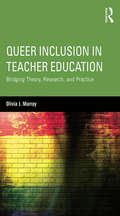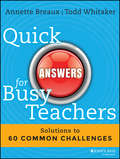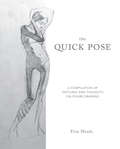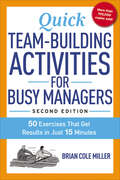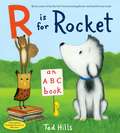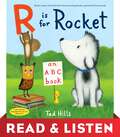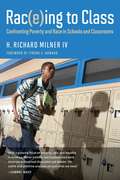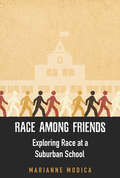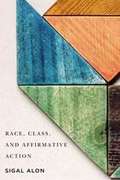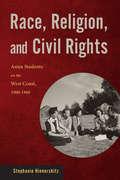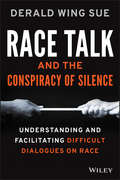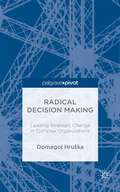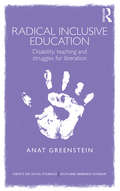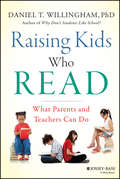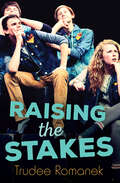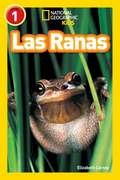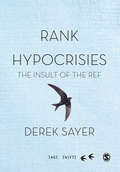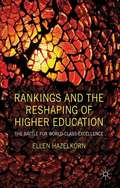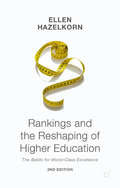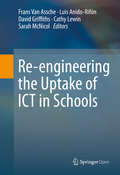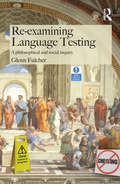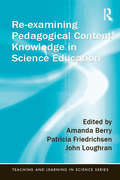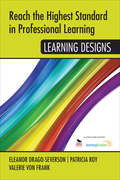- Table View
- List View
Queer Inclusion in Teacher Education: Bridging Theory, Research, and Practice
by Olivia J. MurrayQueer Inclusion in Teacher Education explores the challenges and promises of building queer inclusive pedagogy and curriculum into teacher education. Weaving together theory, research findings, and practical "how-to" strategies and materials, it fills an important gap by offering a clear roadmap and resources for influencing the knowledge, beliefs, and actions of faculty working with pre-service teachers. While the book has implications for policy change, most immediately, readers will feel empowered with ideas for faculty development they can implement in their own teacher education programs. Looking at both the politics and practices of teacher education and the ways in which queer issues manifest in schools, it is hopeful in suggesting that if teachers and pre-service teachers can critically reflect on homophobia and heteronormativity, they can begin to think about and relate to queer youth in a different, more positive and inclusive way. A Companion Website [http://queerinclusion.com] with additional activities and materials for teacher educators and faculty development and a practical guide enhances the usefulness of the book.
Quick Answers for Busy Teachers
by Todd Whitaker Annette BreauxDeftly handle the sixty most common problems classroom teachers faceQuick Answers for Busy Teachers presents some of the most common challenges teachers encounter in the classroom, and provides expert help toward solving those problems. This easy-to-read guide is organized into short, discreet chapters, making it an ideal quick reference for on-the-spot answers, with practical advice and concise, actionable solutions. Readers will develop systems for dealing with issues that repeatedly crop up, from handling the out-of-control class to falling out of love with the job. The book offers innovative methods and techniques that improve student achievement and behavior while minimizing stress on the teacher. Recover from challenging situations with parents, students, coworkers, or administrators, implement a system that keeps those challenges from happening again, and learn to relax and enjoy this richly rewarding profession.Teaching is difficult. Educators must grapple with a roomful of diverse students, an evolving curriculum, massive organization of books, papers, and supplies, and ever-changing technology. They must deal with challenges from uninvolved parents, overinvolved parents, administrators, and fellow educators. This book helps teachers avoid some of the frustration by providing solutions for the sixty most common challenges teachers face.Deal with the student pushing your buttons, and get that student actively engaged in meaningful learningKeep students on task, and deal effectively with poor test performanceSpeak your mind at faculty meetingsDeal with negative coworkers effectivelyHandle problem parents without embarrassing students or sacrificing professionalismAs a teacher, igniting young minds is only a small part of the battle - it's usually everything else that makes teachers occasionally reconsider their career choice. With solutions and systems in place ahead of time, readers can handle challenges swiftly and skillfully with Quick Answers for Busy Teachers.
The Quick Pose: A Compilation of Gestures and Thoughts on Figure Drawing
by Erin MeadsThe foundation of all figurative work is the life study of the human form. Sculptors, painters, and illustrators pull from the process to sharpen their observations, develop better hand-eye coordination, and improve their understanding and interpretation of what they see. Quick Pose: A Compilation of Gestures and Thoughts on Figure Drawing takes a look at the process, presenting first-rate examples and a brief but well-constructed text highlighted by more than 300 illustrations. Author Erin Meads defines the quick pose as figure drawings than can be executed in less than 20 minutes. The majority of images in this book took less than five minutes to draw; their brevity encourages more dynamic poses from the model and challenges the artist to make quick decisions about what to include — and even more significantly, what not to include. Topics include symmetry, foreshortening, light and shadow, drapery, and other essential elements of figure drawing. Artists, art students, art teachers, and anyone who draws will appreciate these well-illustrated insights.
Quick Team-Building Activities for Busy Managers: 50 Exercises That Get Results in Just 15 Minutes
by Brian Cole MillerEliminate the need for time or resources on formal training and get your teams up and running themselves--with only minutes of prep.Between workplace personnel being more culturally diverse than ever before, a generation of employees being raised attached to technology while avoiding human interaction, and an increasing culture of competitiveness that is constantly raising tensions between cubicles, it has become absolutely essential for managers to focus more on camaraderie and building team spirit.Now in its second edition, Quick Team-Building Activities for Busy Managers addresses the problems that drag down group productivity and helps teams:Collaborate successfullyCope with changeSolve problems togetherCommunicate better despite cultural and generational differencesBoost creativitLeverage diversityNurture healthy competitionEach of the 50 team-building activities in this invaluable resource takes only minutes to prep and uses only everyday office items to get its point across. In just 15 minutes a day, the results will be immediate: sullen teams find sparkle, nervous teams gain confidence, teams of strangers get to know one another.There are even activities to help the virtual team! No one will be left out, and all with leave the activity feeling better about their team and their individual role within it.
R Is for Rocket: An ABC Book (Rocket)
by Tad HillsLearn the ABCs with Rocket, the dog who inspires kids to read and write! This irresistible alphabet book from the creator of the New York Times bestsellers How Rocket Learned to Read and Rocket Writes a Story is sure to appeal to kids, parents, teachers, and librarians. From finding acorns, to balancing on a ball, to drawing a colorful caterpillar with crayons, readers will love exploring the wonderful world of Rocket and his friends. The whole cast is featured, among them the little yellow bird, the owl, Bella the squirrel, and more. Even Goose from the beloved and bestselling Duck & Goose books makes a cameo appearance! With charming and delightful scenes for every letter, here's an ode to the wondrous, mighty, gorgeous alphabet.
R Is for Rocket: An ABC Book: Read & Listen Edition (Rocket)
by Tad HillsLearn the ABCs with Rocket, the dog who inspires kids to read and write!This irresistible alphabet book from the creator of the New York Times bestsellersHow Rocket Learned to Read and Rocket Writes a Story is sure to appeal to kids, parents, teachers, and librarians. From finding acorns, to balancing on a ball, to drawing a colorful caterpillar withcrayons, readers will love exploring the wonderful world of Rocket and his friends. The whole cast is featured, among them the little yellow bird, the owl, Bella the squirrel, and more. Even Goose from the beloved and bestselling Duck & Goose books makes a cameo appearance! With charming and delightful scenes for every letter, here's an ode to the wondrous, mighty, gorgeous alphabet.This Read & Listen edition contains audio narration.
Rac(e)ing To Class: Confronting Poverty And Race In Schools And Classrooms
by H. Richard Milner IVIn this incisive and practical book, H. Richard Milner IV provides educators with a crucial understanding of how to teach students of color who live in poverty. Milner looks carefully at the circumstances of these students' lives and describes how those circumstances profoundly affect their experiences within schools and classrooms. In a series of detailed chapters, Milner proposes effective practices--at district and school levels, and in individual classrooms--for school leaders and teachers who are committed to creating the best educational opportunities for these students. Building on established literature, new research, and a number of revelatory case studies, Milner casts essential light on the experiences of students and their families living in poverty, while pointing to educational strategies that are shaped with these students' unique circumstances in mind. Milner's astute and nuanced account will fundamentally change how school leaders and teachers think about race and poverty--and how they can best serve these students in their schools and classrooms.
Rac(e)ing to Class: Confronting Poverty and Race in Schools and Classrooms
by H. Richard Milner IVIn this incisive and practical book, H. Richard Milner IV provides educators with a crucial understanding of how to teach students of color who live in poverty. Milner looks carefully at the circumstances of these students&’ lives and describes how those circumstances profoundly affect their experiences within schools and classrooms. In a series of detailed chapters, Milner proposes effective practices—at district and school levels, and in individual classrooms—for school leaders and teachers who are committed to creating the best educational opportunities for these students. Building on established literature, new research, and a number of revelatory case studies, Milner casts essential light on the experiences of students and their families living in poverty, while pointing to educational strategies that are shaped with these students' unique circumstances in mind. Milner&’s astute and nuanced account will fundamentally change how school leaders and teachers think about race and poverty—and how they can best serve these students in their schools and classrooms.
Race among Friends
by Marianne ModicaMany saw the 2008 election of Barack Obama as a sign that America had moved past the issue of race, that a colorblind society was finally within reach. But as Marianne Modica reveals in Race Among Friends, attempts to be colorblind do not end racism--in fact, ignoring race increases the likelihood that racism will occur in our schools and in society. This intriguing volume focuses on a "racially friendly" suburban charter school called Excellence Academy, highlighting the ways that students and teachers think about race and act out racial identity. Modica finds that even in an environment where students of all racial backgrounds work and play together harmoniously, race affects the daily experiences of students and teachers in profound but unexamined ways. Some teachers, she notes, feared that talking about race in the classroom would open them to charges of racism, so they avoided the topic. And rather than generate honest and constructive conversations about race, student friendships opened the door for insensitive racial comments by whites, resentment and silence by blacks, and racially biased administrative practices. In the end, the school's friendly environment did not promote--and may have hindered--serious discussion of race and racial inequity. The desire to ignore race in favor of a "colorblind society," Modica writes, has become an entrenched part of American culture. But as Race Among Friends shows, when race becomes a taboo subject, it has serious ramifications for students and teachers of all ethnic origins.
Race, Class, and Affirmative Action
by Sigal AlonNo issue in American higher education is more contentious than that of race-based affirmative action. In light of the ongoing debate around the topic and recent Supreme Court rulings, affirmative action policy may be facing further changes. As an alternative to race-based affirmative action, some analysts suggest affirmative action policies based on class. In Race, Class, and Affirmative Action, sociologist Sigal Alon studies the race-based affirmative action policies in the United States. and the class-based affirmative action policies in Israel. Alon evaluates how these different policies foster campus diversity and socioeconomic mobility by comparing the Israeli policy with a simulated model of race-based affirmative action and the U.S. policy with a simulated model of class-based affirmative action. Alon finds that affirmative action at elite institutions in both countries is a key vehicle of mobility for disenfranchised students, whether they are racial and ethnic minorities or socioeconomically disadvantaged. Affirmative action improves their academic success and graduation rates and leads to better labor market outcomes. The beneficiaries of affirmative action in both countries thrive at elite colleges and in selective fields of study. As Alon demonstrates, they would not be better off attending less selective colleges instead. Alon finds that Israel’s class-based affirmative action programs have provided much-needed entry slots at the elite universities to students from the geographic periphery, from high-poverty high schools, and from poor families. However, this approach has not generated as much ethnic diversity as a race-based policy would. By contrast, affirmative action policies in the United States have fostered racial and ethnic diversity at a level that cannot be matched with class-based policies. Yet, class-based policies would do a better job at boosting the socioeconomic diversity at these bastions of privilege. The findings from both countries suggest that neither race-based nor class-based models by themselves can generate broad diversity. According to Alon, the best route for promoting both racial and socioeconomic diversity is to embed the consideration of race within class-based affirmative action. Such a hybrid model would maximize the mobility benefits for both socioeconomically disadvantaged and minority students. Race, Class, and Affirmative Action moves past political talking points to offer an innovative, evidence-based perspective on the merits and feasibility of different designs of affirmative action.
Race, Religion, and Civil Rights
by Stephanie HinnershitzHistories of civil rights movements in America generally place little or no emphasis on the activism of Asian Americans. Yet, as this fascinating new study reveals, there is a long and distinctive legacy of civil rights activism among foreign and American-born Chinese, Japanese, and Filipino students, who formed crucial alliances based on their shared religious affiliations and experiences of discrimination. Stephanie Hinnershitz tells the story of the Asian American campus organizations that flourished on the West Coast from the 1900s through the 1960s. Using their faith to point out the hypocrisy of fellow American Protestants who supported segregation and discriminatory practices, the student activists in these groups also performed vital outreach to communities outside the university, from Californian farms to Alaskan canneries. Highlighting the unique multiethnic composition of these groups, Race, Religion, and Civil Rights explores how the students' interethnic activism weathered a variety of challenges, from the outbreak of war between Japan and China to the internment of Japanese Americans during World War II. Drawing from a variety of archival sources to bring forth the authentic, passionate voices of the students, Race, Religion, and Civil Rights is a testament to the powerful ways they served to shape the social, political, and cultural direction of civil rights movements throughout the West Coast.
Race Talk and the Conspiracy of Silence
by Derald Wing SueLearn to talk about race openly, honestly, and productively Most people avoid discussion of race-related topics because ofthe strong emotions and feelings of discomfort that inevitablyaccompany such conversations. Rather than endure the conflict ofracial realities, many people choose instead to avoid the topicaltogether, or remain silent when it is raised. Race Talk andthe Conspiracy of Silence: Understanding and Facilitating DifficultDialogues on Race puts an end to that dynamic by sharingstrategies for smoothing conversations about race in a productivemanner.A guide for facilitating and participating in difficultdialogues about race, author Derald Wing Sue - aninternationally recognized expert on multiculturalism, diversity,and microaggressions - explores the characteristics,dynamics, and meaning behind discussions about race as well as thehidden "ground rules" that inhibit honest and productive dialogue.Through emotional and visceral examples, this book explains whyconversations revolving around racial issues are so difficult, andprovides guidelines, techniques, and advice for navigating andleading honest and forthright discussions. Readers will develop astronger ability to build rapport with people unlike themselves,and discover how not talking about race impacts society as awhole.Overcome and make visible the fears associated with racetalkLearn practical ideas for talking openly about raceFacilitate and navigate discussion with expert strategyExamine the hidden rules that govern race talkUnderstand the benefits of successful conversationsDiscussions about race do not have to result in disastrousconsequences, and can in fact be highly beneficial to all partiesinvolved. It's important that people have the ability to converseopenly and honestly with their students, colleagues, children, andneighbors, and Race Talk provides the path for achievingthis goal.
Radical Decision Making: Leading Strategic Change in Complex Organizations
by Domagoj HruškaRadical Decision Making offers a controversial new framework to the conventional strategic change management conversation. While many approaches provide a discussion on a singular level, Dr. Hru ka blends theory and research of decision making and social interaction to develop a consistent framework of strategic change. "
Radical Inclusive Education: Disability, teaching and struggles for liberation (Concepts for Critical Psychology)
by Anat GreensteinMany people who work in education start out with enthusiastic ideals about education as a positive force that can spur change in the life of the learner and in society at large, yet find themselves frustrated with a bureaucratic system that often alienates and excludes many of its students. This is particularly true for students identified as having "special educational needs" (SEN) or disability, a label often used to justify the ways in which students are failed by a system that focuses on narrow definitions of knowledge, seeks to normalise and control behaviour, and values economic productivity over other forms of human activity. Radical Inclusive Education explores how current educational practices, such as standardised tests and league tables, exclude and fail many disabled students, and naturalise educational inequalities around gender, class, ethnicity and ability. Informed by the social model of disability, the book argues that educational theories and practices that are geared towards social justice and inclusion need to recognise and value the diversity of human embodiments, needs and capacities, and foster pedagogical practices that support relations of interdependency. The book draws on work in disability studies, critical psychology and critical pedagogy, and also real life examples from interviews with activists in the disabled people’s movement, and from research in a school, to offer examples of what radical inclusive education – that is sensitive to the needs of all students – might look like in practice. As such, it will be of great interest to practitioners and students in the field of education, particularly for those interested in SEN and disability, sociology of education, critical pedagogy, informal education and social movement learning.
Raising Kids Who Read: What Parents and Teachers Can Do
by Daniel T. WillinghamHow parents and educators can teach kids to love reading in the digital age Everyone agrees that reading is important, but kids today tend to lose interest in reading before adolescence. In Raising Kids Who Read, bestselling author and psychology professor Daniel T. Willingham explains this phenomenon and provides practical solutions for engendering a love of reading that lasts into adulthood. Like Willingham's much-lauded previous work, Why Don't Students Like School?, this new book combines evidence-based analysis with engaging, insightful recommendations for the future. Intellectually rich argumentation is woven seamlessly with entertaining current cultural references, examples, and steps for taking action to encourage reading. The three key elements for reading enthusiasm—decoding, comprehension, and motivation—are explained in depth in Raising Kids Who Read. Teachers and parents alike will appreciate the practical orientation toward supporting these three elements from birth through adolescence. Most books on the topic focus on early childhood, but Willingham understands that kids' needs change as they grow older, and the science-based approach in Raising Kids Who Read applies to kids of all ages. A practical perspective on teaching reading from bestselling author and K-12 education expert Daniel T. Willingham Research-based, concrete suggestions to aid teachers and parents in promoting reading as a hobby Age-specific tips for developing decoding ability, comprehension, and motivation in kids from birth through adolescence Information on helping kids with dyslexia and encouraging reading in the digital age Debunking the myths about reading education, Raising Kids Who Read will empower you to share the joy of reading with kids from preschool through high school.
Raising the Stakes (Orca Limelights)
by Trudee TomanekIt's the start of a new season for Harrington High's improv team--and Chloe is determined that this will be the year they make it all the way to the top. Her teammates (who also happen to be her closest friends) are a talented bunch, and she knows they can do it. They have to. Because getting to nationals is Chloe's best chance to prove--to her parents, to the improv scouts and, most of all, to herself--that she has what it takes to succeed. Chloe is doing everything she can to help her teammates perform better. So why are they all mad at her?
Las Ranas (National Geographic Readers #1)
by Elizabeth CarneyAprende todo sobre las ranas en este emocionante libro para niños en español.Está lleno de imágenes bellas e interesantes que les enseñan a los niños todo sobre estos animales asombrosos. Este libro de Nivel 1 es apropiado para los primeros pasos de lectura independiente o para una experiencia de lectura en voz alta, ¡perfecto para motivar a futuros científicos y exploradores!
Rank Hypocrisies: The Insult of the REF (SAGE Swifts)
by Professor Derek Sayer"In crystalline text steeped in cold rage, Sayer takes aim at the REF’s central claim, that it is a legitimate process of expert peer review. He critiques university and national-level REF processes against actual practices of scholarly review as found in academic journals, university presses, and North American tenure procedures. His analysis is damning. If the REF fails as scholarly review, how can academics and universities continue to participate? And how can government use its rankings as a basis for public policy?" - Tarak Barkawi, London School of Economics "Sayer makes a compelling argument that the Research Excellence Framework is not only expensive and divisive, but is also deeply flawed as an evaluation exercise. Rank Hypocrisies is a rigorous and scholarly evaluation of the REF, yet written in a lively and engaging style that makes it highly readable." - Dorothy Bishop, University of Oxford Few decisions are as consequential for the funding and reputation of Britain's universities as those of REF panels. Not only do REF rankings determine the levels of research funding universities receive from the state. They equally affect institutions' ability to attract external grants, top-flight faculty, and graduate students. Whatever benefit the UK's periodic research assessment exercises may have brought to research productivity, the REF has been widely criticized for its enormous costs in taxpayers' money and academics' time, its discouragement of innovative (and especially interdisciplinary) research, and its negative effects on collegiality and staff morale. Derek Sayer extends these arguments, notably through his discussion of the questionable staff selection processes used in REF2014 within his own university. Where Rank Hypocrisies goes beyond previous critiques is in its open challenge to the REF's claim to provide 'expert review of the outputs' - the very heart of its legitimacy. Examining the composition and operation of REF disciplinary subpanels in forensic detail, Sayer paints a picture in which overburdened assessors assign vaguely defined grades in fields that are frequently not their own while ignoring all external indicators of the academic influence of the publications they are appraising, and then shred all records of their deliberations. Judged against international norms of peer review, the REF is an elaborate charade - and an insult to the core values of the academy.
Rank Hypocrisies
by Derek Sayer"The REF is right out of Havel's and Kundera's Eastern Europe: a state-administered exercise to rank academic research like hotel chains dependent on the active collaboration of the UK professoriate. In crystalline text steeped in cold rage, Sayer takes aim at the REF's central claim, that it is a legitimate process of expert peer review. He critiques university and national-level REF processes against actual practices of scholarly review as found in academic journals, university presses, and North American tenure procedures. His analysis is damning. If the REF fails as scholarly review, how can academics and universities continue to participate? And how can government use its rankings as a basis for public policy?" - Tarak Barkawi, Reader in the Department of International Relations, London School of Economics "Many academics across the world have come to see the REF as an arrogant attempt to raise national research standards that has resulted in a variety of self-inflicted wounds to UK higher education. Derek Sayer is the Thucydides of this situation. A former head of the Lancaster history department, he fell on his sword trying to deal with a university that behaved in an increasingly irrational manner as it tried to game a system that is fundamentally corrupt in both its conception and execution. Rank Hypocrisies is more than a cri de coeur. It is the best documented diagnosis of a regime that has distorted the idea of peer review beyond recognition. Only someone with the clear normative focus of a former insider could have written this work." - Steve Fuller, Auguste Comte Chair in Social Epistemology, Warwick University Few decisions are as consequential for the funding and reputation of Britain's universities as those of REF panels. Not only do REF rankings determine the levels of research funding universities receive from the state. They equally affect institutions' ability to attract external grants, top-flight faculty, and graduate students. Whatever benefit the UK's periodic research assessment exercises may have brought to research productivity, the REF has been widely criticized for its enormous costs in taxpayers' money and academics' time, its discouragement of innovative (and especially interdisciplinary) research, and its negative effects on collegiality and staff morale. Derek Sayer extends these arguments, notably through his discussion of the questionable staff selection processes used in REF2014 within his own university. Where Rank Hypocrisies goes beyond previous critiques is in its open challenge to the REF's claim to provide 'expert review of the outputs' - the very heart of its legitimacy. Examining the composition and operation of REF disciplinary subpanels in forensic detail, Sayer paints a picture in which overburdened assessors assign vaguely defined grades in fields that are frequently not their own while ignoring all external indicators of the academic influence of the publications they are appraising, and then shred all records of their deliberations. Judged against international norms of peer review, the REF is an elaborate charade - and an insult to the core values of the academy.
Rankings and the Reshaping of Higher Education
by Ellen HazelkornTen years have passed sincethe first global ranking of universities was published. Since then, universityrankings have continued to attract the attention of policymakers and theacademy, challenging perceived wisdom about the status and reputation, as wellas quality and performance, of higher education institutions. Their impact andinfluence has impacted and influenced policymakers, students and parents,employers and other stakeholders - in addition to higher education institutionsaround the world. They are now a significant factor shaping institutionalambition and reputation, and national priorities. The second edition of Rankings and the Reshaping of HigherEducation, now in paperback, brings the story of rankings up-to-date. It contains new originalresearch, and extensive analysis of the rankings phenomenon. Ellen Hazelkorndraws together a wealth of international experience to chronicle how rankingsare helping reshape higher education in the age of globalization. Written in aneasy but authoritative style, this book makes an important contribution to ourunderstanding of rankings and global changes in higher education. It is essentialreading for policymakers, institutional leaders, managers, advisors, andscholars.
Rankings and the Reshaping of Higher Education
by Ellen HazelkornTen years have passed sincethe first global ranking of universities was published. Since then, universityrankings have continued to attract the attention of policymakers and theacademy, challenging perceived wisdom about the status and reputation, as wellas quality and performance, of higher education institutions. Their impact andinfluence has impacted and influenced policymakers, students and parents,employers and other stakeholders - in addition to higher education institutionsaround the world. They are now a significant factor shaping institutionalambition and reputation, and national priorities. The second edition of Rankings and the Reshaping of HigherEducation, now in paperback, brings the story of rankings up-to-date. It contains new originalresearch, and extensive analysis of the rankings phenomenon. Ellen Hazelkorndraws together a wealth of international experience to chronicle how rankingsare helping reshape higher education in the age of globalization. Written in aneasy but authoritative style, this book makes an important contribution to ourunderstanding of rankings and global changes in higher education. It is essentialreading for policymakers, institutional leaders, managers, advisors, andscholars.
Re-engineering the Uptake of ICT in Schools
by Frans Van Assche Luis Anido David Griffiths Cathy Lewin Sarah McnicolThis book reports on a novel and comprehensive approach to the uptake of ICT in Schools. It focuses on key questions, pedagogically sound ways of introducing ICT, new technical artifacts supporting the approach, the evaluation in a large-scale validator, and future work. While many innovations in Technology Enhanced Learning (TEL) have emerged over the last two decades, the uptake of these innovations has not always been very successful, particularly in schools. The transition from proof of concept to integration into learning activities has been recognized as a bottleneck for quite some time. This major problem, which is affecting many TEL stakeholders, is the focus of this book which focuses on developing a more effective and efficient approach based on more than 2500 pilots in European classrooms. Teachers, head teachers, and policy makers may benefit from reading how novel learning scenarios can be elaborated, adapted to a local context, and implemented in the classroom; how new technologies can support this process for teachers and their national/regional communities; how teachers and other stakeholders can be educated in such a re-engineering process; how the approach can be scaled up through MOOCs, ambassador schemes, and train-the-trainer programs; how future classroom labs can inspire teachers, head teachers, and policy makers; how teachers and, above all, learners can become more engaged in learning through the adoption of the iTEC approach. Readers with a more technical focus may also be interested in the discussion of recommender systems, the flexible provision of resources and services, the deployment of the cloud in schools, and systems for composing technological support for lesson plans.
Re-examining Language Testing: A Philosophical and Social Inquiry
by Glenn FulcherWinner of the SAGE/ILTA Book Award 2016 Re-examining Language Testing explores ideas that form the foundations of language testing and assessment. The discussion is framed within the philosophical and social beliefs that have forged the practices endemic in language education and policy today. From historical and cultural perspectives, Glenn Fulcher considers the evolution of language assessment, and contrasting claims made about the nature of language and human communication, how we acquire knowledge of language abilities, and the ethics of test use. The book investigates why societies use tests, and the values that have driven changes in practice over time. The discussion is presented within an argument that an Enlightenment inspired view of human nature and advancement is most suited to a progressive, tolerant, and principled theory of language testing and validation. Covering key topics such as measurement, validity, accountability and values, Re-examining Language Testing provides a unique and innovative analysis of the ideas and social forces that shape the practice of language testing. It is an essential read for advanced undergraduate and postgraduate students of Applied Linguistics and Education. Professionals working in language testing and language teachers will also find this book invaluable.
Re-examining Pedagogical Content Knowledge in Science Education (Teaching and Learning in Science Series)
by Amanda Berry John Loughran Patricia FriedrichsenPedagogical Content Knowledge (PCK) has been adapted, adopted, and taken up in a diversity of ways in science education since the concept was introduced in the mid-1980s. Now that it is so well embedded within the language of teaching and learning, research and knowledge about the construct needs to be more useable and applicable to the work of science teachers, especially so in these times when standards and other measures are being used to define their knowledge, skills, and abilities. Re-examining Pedagogical Content Knowledge in Science Education is organized around three themes: Re-examining PCK: Issues, ideas and development; Research developments and trajectories; Emerging themes in PCK research. Featuring the most up-to-date work from leading PCK scholars in science education across the globe, this volume maps where PCK has been, where it is going, and how it now informs and enhances knowledge of science teachers’ professional knowledge. It illustrates how the PCK research agenda has developed and can make a difference to teachers’ practice and students’ learning of science.
Reach the Highest Standard in Professional Learning: Learning Designs
by Eleanor Drago-Severson Patricia A. Roy Valerie Von FrankThe right learning design can support professional growth! Learning Forward is a leader in understanding and advancing professional learning that leads to student success. This series explores Learning Forward’s seven Standards for Professional Learning which outline the characteristics of effective professional learning that, collectively, advance teaching and learning. In this volume, you’ll get original essays, an inspirational case study, and detailed guidance on implementing the Design standard. Deepen your knowledge of standards with An original essay by Eleanor Drago-Severson that offers a fresh take on designs for professional learning that is grounded in adult developmental theory Practical tools that assist readers in selecting appropriate learning designs that promote educator growth Examples of powerful designs for professional learning that are job-embedded, promote active engagement, and support implementation With this book, educators will reach new heights of professional growth and students will reap the benefits.
